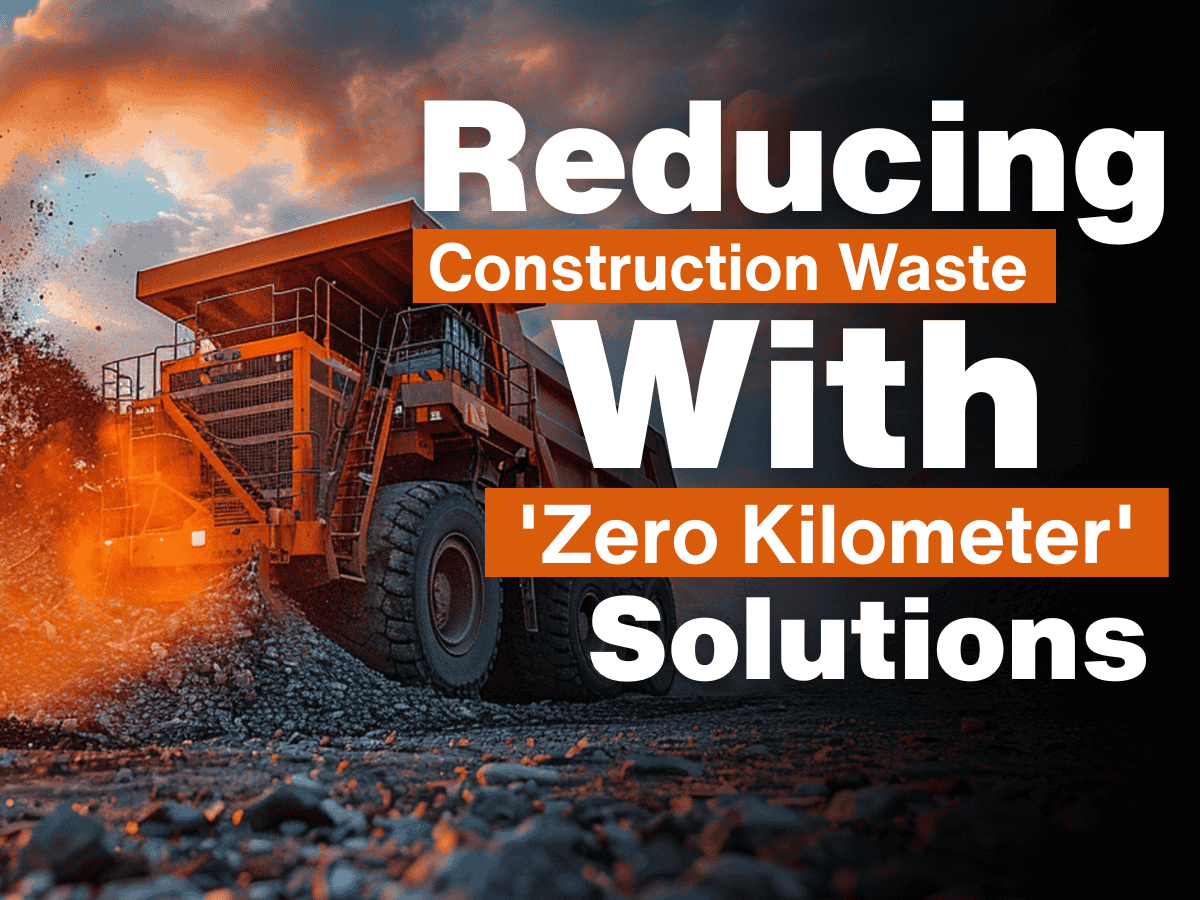ceat-speciality:blogs-tags/all,ceat-speciality:blogs-tags/construction-&-industrial
On-Site Recycling: Reducing Construction Waste with 'Zero Kilometre' Solutions
Wed, 11 Jun 2025 | PRODUCTS
The construction industry is one of the largest contributors to global waste, with materials such as concrete, wood, metal, and plastic often ending up in landfills. These discarded materials not only increase environmental pollution but also deplete natural resources that could otherwise be preserved through efficient recycling. As urbanisation and infrastructure projects continue to expand worldwide, there is an urgent need to adopt sustainable waste management strategies that minimize environmental impact while promoting circular economy practices.
Traditionally, construction waste is hauled away from job sites to external recycling plants or landfill sites. This process requires significant energy, transportation costs, and logistical coordination—adding to fuel consumption, carbon emissions, and project expenses. With stricter government regulations and increasing industry awareness, on-site recycling is gaining momentum as a more sustainable alternative. The concept of ‘Zero Kilometre’ recycling is proving to be a game-changer, reducing waste transportation, emissions, and material inefficiencies—all while making construction projects more environmentally responsible.
What Is ‘Zero Kilometre’ Recycling?
Zero Kilometre recycling is a construction waste management approach that involves recycling and repurposing materials directly at the job site rather than sending them to external processing facilities. This means construction firms can process waste within their premises, cutting down fuel costs, emissions, and time delays associated with material transportation.
The Zero Kilometer strategy aligns with sustainability goals by maximising material reuse, minimizing dependence on new resources, and improving overall construction efficiency. Whether it’s crushed concrete repurposed for pavement sub-base or salvaged wood reused for interior fittings, on-site recycling offers practical solutions that integrate seamlessly into modern construction workflows.
Key Benefits of Zero Kilometre Recycling
- Reduction in Transportation Emissions: Eliminating the need for hauling waste significantly cuts carbon footprints, contributing to cleaner air and improved environmental health.
- Lower Project Costs: Less reliance on off-site processing facilities saves money on fuel, disposal fees, and logistics, ensuring cost-effective project execution.
- Enhanced Efficiency & Material Availability: Recycled materials are instantly available at the job site, accelerating construction timelines while reducing supply chain disruptions.
- Improved Sustainability Credentials: Companies adopting Zero Kilometre recycling demonstrate environmental responsibility, strengthening their brand reputation and compliance with eco-friendly regulations.
How On-Site Recycling Works?
Step 1: Sorting & Processing
Effective waste management begins with sorting reusable materials from non-recyclable debris. On-site crushers, grinders, and material separators are deployed to efficiently process concrete, wood, metal, and asphalt—ensuring each material is carefully repurposed for its next use.
Step 2: Repurposing Waste
Rather than discarding materials, Zero Kilometer recycling transforms construction waste into valuable resources. Examples include:
- Crushed concrete repurposed for road sub-base and site foundations.
- Reclaimed wood used for decorative panels, flooring, or furniture.
- Metal scraps incorporated into reinforcement bars, new machinery parts, or electrical fixtures.
Step 3: Seamless Integration of Recycled Materials
On-site recycling ensures immediate reuse of processed materials, strengthening sustainability efforts. For instance, recycled aggregates are repurposed for paving, landscaping, and insulation, reducing reliance on virgin resources while maintaining project durability.
CEAT Specialty: Supporting Sustainable Construction with Reliable Tyres
For construction projects implementing on-site recycling, heavy machinery must operate efficiently under demanding conditions. This is where CEAT Specialty’s premium construction and industrial tyres play a vital role.
Designed for modern construction equipment, CEAT Specialty tyres deliver exceptional traction, durability, and performance—ensuring project efficiency regardless of terrain challenges.
Whether navigating recycled aggregates, manoeuvring through uneven terrain, or optimising fuel efficiency, CEAT Specialty’s high-performance tyres help construction firms achieve greater productivity while supporting sustainability goals. These tyres are engineered to minimise wear and maximise operational stability, making them an ideal choice for heavy-duty applications in sustainable construction.
Innovative Trends Driving ‘Zero Kilometre’ Solutions
To further optimise on-site recycling, technology-driven solutions are emerging within the construction industry. Key advancements include:
- Automated sorting and AI-driven waste categorisation, improving efficiency in material segregation.
- Portable modular recycling units, reducing reliance on large-scale external facilities.
- Advanced material repurposing techniques, ensuring higher reuse rates and project reliability.
Companies investing in these technologies are achieving over 90% waste reduction, proving that Zero Kilometre recycling is not just an emerging trend but a long-term sustainable solution.
Understanding the Environmental Impact
Beyond cost savings, Zero Kilometre recycling contributes significantly to:
- Carbon footprint reduction, minimising harmful emissions from waste transportation.
- Natural resource conservation, reducing demand for new concrete, metal, and wood.
- Circular economy adoption, promoting closed-loop material reuse in construction.
Governments and environmental agencies worldwide are encouraging on-site recycling efforts through sustainability incentives, reinforcing its importance in green infrastructure development.
Final Thoughts
The transformation towards Zero Kilometre solutions is revolutionising construction waste management, ensuring cost-effective, eco-friendly practices. By integrating on-site recycling into projects, construction firms enhance their competitive edge, cut costs, and contribute to a greener future.
With CEAT Specialty’s advanced tyres, modern construction machinery can operate at peak performance, enabling the industry to build sustainably without compromising efficiency or quality. The shift toward Zero Kilometre recycling is not just a necessity—it’s the future of responsible construction.







.png)














